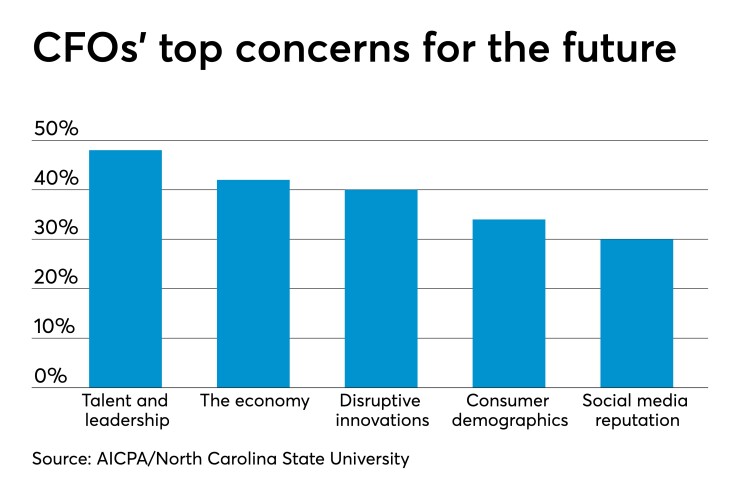Almost half of U.S. chief financial officers cite managing their organization’s talent and leadership needs among their most pressing concerns, according to a new report from the American Institute of CPAs and North Carolina State University’s Enterprise Risk Management Initiative.
The report found that 48 percent of CFOs feel they are “mostly” or “extensively” concerned about their organization's ability to manage leadership and talent needs. Other top concerns include the impact of the economy (42 percent), disruptive innovations (40 percent), shifts in consumer/social demographics (34 percent) and social media harming their organization’s brand (30 percent).
“In this environment of unprecedented levels of risk, CFOs must take the lead and guide their organizations to approach, evaluate and mitigate risk in a very systematic way,” said Ash Noah, managing director of CGMA Learning, Education and Development at the Association of International Certified Professional Accountants, in a statement. “ERM provides organizations with a way to create and maximize value for their shareholders and stakeholders, ensuring the long-term viability of the business.”
Fifty-nine percent of the senior finance leaders polled were also in agreement that both the volume and complexity of corporate risks have largely changed over the last five years. Despite this, 69 percent of these leaders said their organizations do not have a complete ERM process in place, with only 23 percent rating their organization's risk management oversight as “mature” or “robust.” This isn't to say that organizations aren't taking any steps to change this, as the rate of organizations who tout complete ERM processes has increased from 9 to 31 percent over the last decade.
“While most executives perceive that uncertainties in the business environment are leading to more complex risk challenges for their organizations, few executives describe their organization’s approach to risk management as mature or robust,” stated Mark Beasley, professor of enterprise risk management and accounting, and director of NC State’s ERM Initiative. “That may be changing, given the majority of organizations have external stakeholders and boards of directors who are calling for more extensive management involvement in risk oversight.”

Other notable findings from the report include:
- Respondents cited a growing demand for chief risk officers, with the percentage of organizations claiming to have designated CROs increasing from 18 to 50 percent over the last 10 years.
- Organizations with management-level risk committees has increased from 22 percent in 2009 to 65 percent in 2019.
- Less than 20 percent of organizations view their risk management processes as providing "important strategic advantage," and only 26 percent say their board of directors discusses risk exposures when reviewing the organization’s strategic plan.
- When asked why they weren't implementing ERM processes within their organizations, respondents cited risk being monitored in other ways (51 percent), competing priorities (49 percent) and insufficient resources (46 percent) as their top reasons.
For the full report, head to the AICPA's





